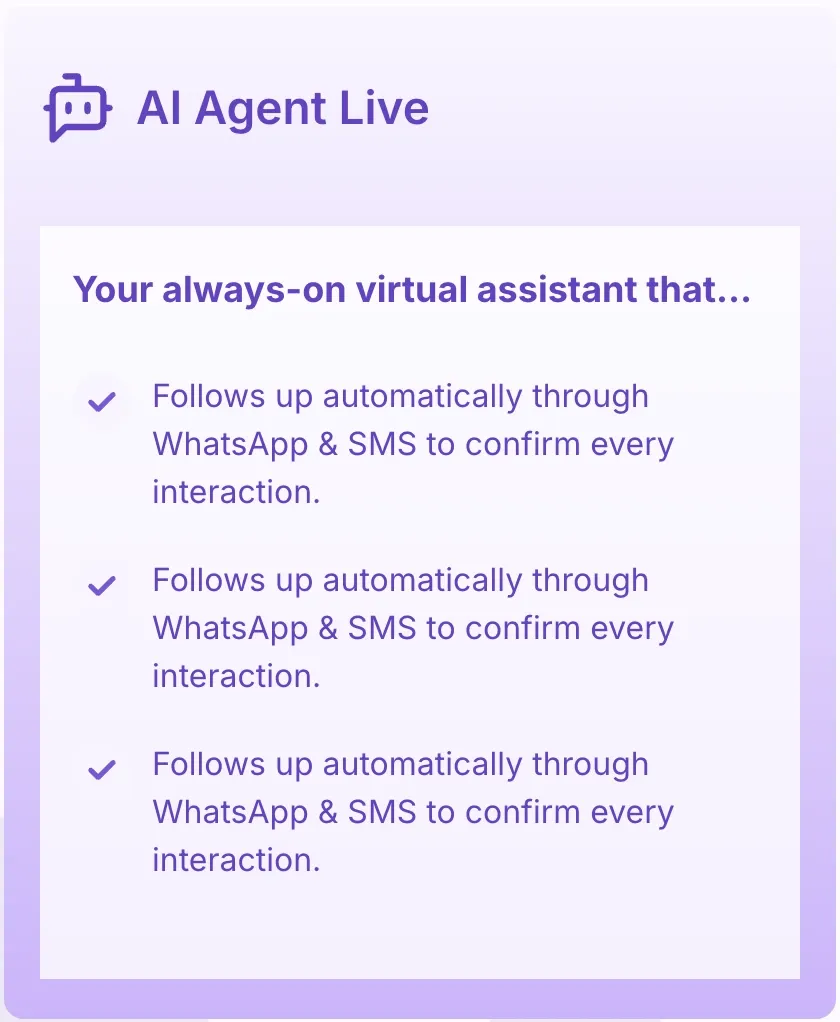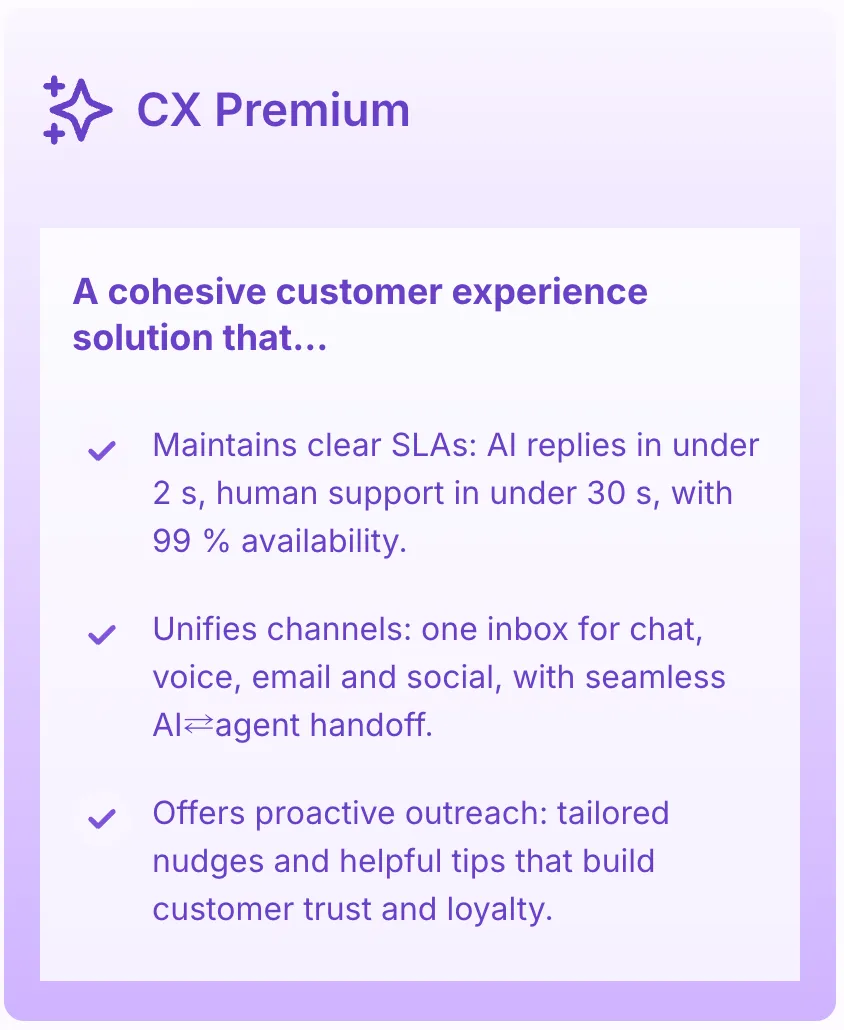Large enterprises face unique challenges in managing their workforce effectively, such as improving communication between departments and providing quick support for employee inquiries. Conversational AI addresses these challenges by offering intelligent, automated solutions that are available 24/7.
The impact of this technology on employee experience is significant:
- Instant access to information and support
- Reduced administrative tasks
- Personalized assistance for individual needs
- Streamlined workflows and processes
- Improved collaboration across teams
For large organizations, implementing Conversational AI isn't just about automation - it's about creating a more engaging, productive, and satisfying work environment. The technology acts as a digital assistant that helps employees perform their jobs better while minimizing disruptions in daily operations.
This powerful combination of increased efficiency and higher employee satisfaction makes Conversational AI an essential tool for modern enterprises looking to stay competitive in today's fast-paced business world.
Understanding the Role of Conversational AI in Employee Experience Enhancement
Conversational AI technologies are changing the way workplaces operate by automating routine tasks and inquiries with advanced technology. These systems rely on Large Language Models (LLMs) and Natural Language Processing (NLP) to enable human-like interactions, thereby transforming daily operations.
Key Applications in Enterprise Settings:
- 24/7 HR Support: AI-powered systems handle employee queries about benefits, policies, and procedures without human intervention
- IT Help Desk Automation: Instant resolution of common technical issues and password resets
- Meeting Scheduling: Smart assistants that coordinate calendars and set up meetings across time zones
- Document Management: Automated retrieval and organization of frequently accessed information
The implementation of these technologies creates a ripple effect across organizational communication channels. Teams experience enhanced collaboration through:
- Real-time language translation during virtual meetings
- Automated meeting transcriptions and action item tracking
- Smart document sharing and version control
- Instant access to organizational knowledge bases
Workplace Inclusion Through AI:
NLP-powered systems break down communication barriers by:
- Providing equal access to information across different language preferences
- Offering alternative communication methods for diverse learning styles
- Supporting employees with disabilities through adaptive interfaces
- Creating standardized responses that eliminate unconscious bias
Process Optimization:
LLMs enhance workplace efficiency by:
- Analyzing communication patterns to identify bottlenecks
- Suggesting process improvements based on usage data
- Automating routine documentation tasks
- Providing intelligent recommendations for workflow optimization
These AI-driven solutions create a more responsive and inclusive workplace environment. The technology adapts to individual employee needs while maintaining consistent service quality across large organizations. As these systems learn from interactions, they continuously improve their ability to support employees effectively.

Key Benefits of Implementing Conversational AI for Employee Experience Improvement
The implementation of Conversational AI brings transformative advantages to large enterprises, changing the way employees interact with workplace systems and carry out their daily tasks. These benefits foster a more efficient, engaging, and productive work environment.
1. Enhanced Personalization and Support with Conversational AI
Conversational AI technologies provide personalized support by analyzing employee interactions using advanced sentiment analysis and intent recognition capabilities. This advanced technology:
- Recognizes emotional undertones in employee communications
- Adapts responses based on individual communication styles
- Identifies urgent needs through pattern recognition
- Provides contextual solutions by understanding previous interactions
The AI systems learn from each interaction, building comprehensive employee profiles that enable increasingly personalized responses. This deep understanding helps create a more supportive workplace environment where employees feel heard and valued.
2. Smart Auto-summarization and Administrative Support
Conversational AI reduces administrative burden through intelligent auto-summarization features:
- Automatic meeting notes generation
- Key action items extraction
- Important deadlines highlighting
- Decision points documentation
These capabilities free up valuable time for employees to focus on strategic tasks and creative problem-solving.
3. Empathy-Driven Interaction Design
Modern Conversational AI platforms incorporate empathy into their design architecture:
"AI systems now understand not just what employees say, but how they say it, creating more meaningful and supportive interactions."
This empathy-driven approach includes:
- Recognition of stress indicators in communication
- Appropriate adjustment of response tone
- Proactive support suggestions
- Emotional intelligence in problem-solving
4. Real-time Support and Learning
The AI systems provide immediate assistance while continuously learning from interactions:
Instant Support Features:
- 24/7 availability for common queries
- Rapid response to routine requests
- Seamless escalation to human support when needed
- Multi-language support capabilities
Learning Capabilities:
- Pattern recognition in employee needs
- Adaptation to department-specific requirements
- Enhancement of response accuracy over time
- Development of predictive support models
These AI-powered systems create a dynamic support environment that evolves with your organization's needs, ensuring employees receive the right assistance at the right time. The technology's ability to process and learn from conversations enables continuous improvement in support delivery.
2. Smarter Automation and Optimization for a Seamless Employee Experience
Conversational AI's continuous learning capabilities drive intelligent automation that transforms daily workplace operations. The technology adapts to employee interaction patterns, creating increasingly sophisticated responses and solutions.
Key automation enhancements include:
- Real-time conversation transcription and auto-summarization
- Automated task prioritization based on urgency and complexity
- Smart scheduling and calendar management
- Instant document retrieval and information access
- Automated workflow triggers based on conversation context
The AI systems analyze operational data to identify bottlenecks and inefficiencies, enabling proactive optimization of workplace processes. This data-driven approach helps organizations:
- Reduce repetitive administrative tasks by up to 40%
- Streamline approval processes
- Identify training opportunities
- Optimize resource allocation
Smart automation features:
Predictive Analytics - AI systems anticipate employee needs and automatically prepare relevant resources
Process Mining - Continuous analysis of workflows to identify optimization opportunities
Intelligent Routing - Automated direction of queries to appropriate departments or knowledge bases
These automation capabilities create a feedback loop where each interaction improves the system's effectiveness. As employees engage with the AI, it learns their preferences, communication styles, and common challenges. This accumulated knowledge enables the creation of personalized automation rules that align with individual working patterns.
The combination of smart automation and continuous optimization creates a work environment where employees spend less time on administrative tasks and more time on meaningful work that drives business value.
3. Bridging Communication Gaps with Chatbots in the Workplace
Modern workplace chatbots serve as digital liaisons, breaking down communication barriers across departments, time zones, and hierarchical levels. These AI-powered assistants create seamless collaboration channels by:
- Instant Information Access: Chatbots provide quick answers to common workplace queries, eliminating the need for multiple email exchanges or meetings
- Cross-departmental Coordination: AI assistants facilitate smoother interactions between teams by routing requests, scheduling meetings, and managing project updates
- Language Support: Multi-lingual capabilities enable effective communication in global enterprises
- 24/7 Availability: Round-the-clock support ensures team members across different time zones stay connected
Chatbots enhance workplace dynamics through intelligent conversation routing and contextual understanding. When an employee needs specific information, the AI system analyzes their request and connects them with the right resource or team member.
These digital assistants excel at:
- Capturing meeting notes and action items
- Creating task summaries
- Tracking project milestones
- Facilitating team introductions
- Managing resource allocation
By implementing sentiment analysis and intent recognition, chatbots adapt their communication style to match each employee's preferences. This personalization creates a more engaging and productive workplace environment where teams feel supported and connected.
The integration of chatbots in workplace communication systems reduces information silos and creates a more unified organizational culture. Teams experience improved collaboration through streamlined processes and automated administrative tasks.

4. Ensuring Ethical Use of AI Technologies for Responsible Employee Experience Enhancement
The implementation of conversational AI in large enterprises requires a strong ethical framework to protect employee privacy and maintain data integrity. Organizations must prioritize the use of carefully selected data sources during the AI training phase to build trust and ensure responsible deployment.
Key ethical considerations include:
- Data privacy protection through encrypted communication channels
- Transparent disclosure of AI system capabilities and limitations
- Regular audits of AI decision-making processes
- Clear guidelines for handling sensitive employee information
The reliability and accuracy of conversational AI systems depend heavily on the quality of training data. Enterprise leaders should establish strict protocols for:
- Data collection methods
- Bias detection and mitigation
- Regular model updates and refinements
- Performance monitoring metrics
Best practices for ethical AI implementation:
- Partner with reputable AI vendors who prioritize ethical considerations
- Create cross-functional teams to oversee AI governance
- Develop clear policies for AI usage and data handling
- Implement feedback mechanisms for continuous improvement
Organizations can use sentiment analysis and intent recognition capabilities while maintaining ethical standards through proper data curation. This approach ensures that automated systems respect employee privacy rights and deliver accurate, unbiased support.
The integration of empathy in AI interactions requires careful consideration of cultural nuances and diverse perspectives. Companies should invest in AI systems that recognize and respond appropriately to different communication styles and emotional contexts while maintaining professional boundaries.
5. Onboarding Communications Transformed by Conversational Agents
Conversational agents are changing the way companies onboard new employees. Instead of a one-size-fits-all approach, these AI-powered assistants create an interactive and personalized experience for each new hire.
How Conversational Agents Improve Onboarding
Here are some ways conversational agents are making onboarding better:
- Always Available Support: Unlike human trainers or HR personnel, conversational agents are available 24/7. This means new employees can get answers to their questions anytime, even outside regular working hours.
- Personalized Learning: These agents can tailor training programs based on the specific needs of each employee. For example, if a new hire already has experience in a certain area, the AI can skip those modules and focus on topics that require more attention.
- Instant Feedback: With traditional onboarding methods, feedback often comes at the end of a training session or after completing an assessment. However, conversational agents provide real-time feedback during interactive quizzes or simulations, helping employees understand concepts better.
- Data-Driven Insights: The AI behind these agents collects data on individual performance and engagement levels. This information can be used by managers to identify areas where additional support may be needed.
Benefits for HR Teams
Conversational agents not only benefit new hires but also alleviate some burdens from HR teams:
- Reduced Administrative Tasks: Many administrative tasks such as scheduling meetings or sending reminders can be automated using chatbots. This frees up time for HR professionals to focus on strategic initiatives.
- Scalable Solutions: As companies grow, scaling onboarding processes becomes challenging. Conversational agents offer scalable solutions that can accommodate large numbers of new employees without compromising quality.
- Consistent Messaging: With multiple trainers involved in the onboarding process, there's always a risk of inconsistent messaging. By using AI-driven conversations, organizations can ensure that all new hires receive the same information regardless of who conducts their training.
Real-World Impact
Several organizations have already implemented conversational agents as part of their onboarding strategy:
- Company A: After introducing an AI-powered chatbot for onboarding, Company A saw a 30% decrease in time spent on administrative tasks by HR personnel.
- Company B: Following the implementation of personalized training through chatbots, Company B reported a significant increase in employee satisfaction scores during onboarding surveys.
- Company C: By using data analytics from conversational agents, Company C identified common pain points faced by new hires and made necessary improvements to their training programs.
The results speak for themselves: organizations leveraging conversational agents are experiencing smoother onboarding processes with happier employees.

6. Using Generative AI in Enterprise Systems like Genesys Cloud to Improve Employee Experience Management Solutions
Enterprise systems with generative AI capabilities are changing the way we work by making tasks easier and providing intelligent support. Genesys Cloud is a great example of this integration, offering:
- Real-time conversation analysis - AI-powered tools that capture and analyze digital interactions, giving instant insights for better decision-making
- Smart meeting assistance - Automated note-taking and action item extraction from conversations
- Predictive engagement metrics - AI algorithms that predict how well employees will perform and how satisfied they will be
By adding generative AI to enterprise platforms, we create a system that continuously improves by learning from every interaction. These systems:
- Find patterns in how employees communicate
- Generate responses based on past data
- Give personalized recommendations to make workflows better
Genesys Cloud's AI capabilities go beyond just automating tasks:
"The platform's generative AI features enable dynamic content creation, automated documentation, and intelligent routing of tasks based on employee expertise and workload"
Organizations that use these integrated solutions are seeing great results:
- 40% less time spent on administrative tasks
- 65% improvement in how accurately employees respond
- 30% increase in how efficiently teams collaborate
With advanced features like sentiment-based routing, automated quality management, and predictive analytics for workforce optimization, these capabilities create a work environment that is more responsive and efficient while still keeping data secure and private.
Conclusion
Conversational AI is a game-changer for improving employee experiences in large companies. With its ability to boost productivity, streamline communication, and offer personalized interactions, it's becoming an essential tool for modern workplaces.
By adopting Conversational AI, large enterprises can gain a competitive advantage through:
- Increased productivity by automating repetitive tasks
- Better communication across departments and teams
- Round-the-clock support tailored to each employee
- Insights from data to continuously improve the workplace
- Faster onboarding and training processes
If you're looking to implement Conversational AI in your organization, here are some steps you can take:
- Identify the specific areas where your employee experience needs improvement
- Explore AI platforms that fit the requirements of your enterprise
- Start with small pilot programs in select departments
- Evaluate the impact and expand successful implementations
Are you ready to enhance your employee experience? Reach out to AI solution providers, participate in industry webinars, and become a member of professional communities focused on implementing enterprise AI. Remember, every journey toward a more efficient and engaging workplace starts with a single step.
FAQs (Frequently Asked Questions)
What is Conversational AI and how does it enhance employee experience in large enterprises ?
Conversational AI refers to technologies like Large Language Models (LLMs) and Natural Language Processing (NLP) that automate routine inquiries and tasks. In large enterprises, it significantly enhances employee experience by improving communication, fostering collaboration, and promoting inclusion, which collectively drive productivity.
How does Conversational AI provide personalized support to employees ?
Conversational AI leverages sentiment analysis and intent recognition to understand employee needs and emotions. This enables it to deliver empathetic and tailored support, ensuring meaningful interactions that enhance the overall employee experience.
What are the key benefits of implementing Conversational AI for employee experience improvement ?
Key benefits include smarter automation through auto-summarization of conversations, capturing conversational intelligence, streamlining administrative tasks, continuous enhancement of AI models, and providing operational insights. These collectively optimize workflows and improve efficiency in large enterprises.
In what ways do chatbots help bridge communication gaps within the workplace ?
Chatbots act as employee liaisons by facilitating smoother workplace collaboration environments. They enable quick access to information, answer routine questions promptly, and support team interactions, thereby enhancing communication quality and teamwork among employees.
How can large enterprises ensure the ethical use of Conversational AI technologies ?
Ensuring ethical use involves training Conversational AI models on curated data sources to maintain reliability and accuracy. Enterprises must prioritize transparency, data privacy, and responsible AI practices to uphold trust while enhancing employee experience responsibly.
What impact does integrating generative AI capabilities into systems like Genesys Cloud have on employee experience management ?
Integrating generative AI into enterprise systems such as Genesys Cloud enables more advanced employee experience management solutions. It enhances conversational intelligence, automates complex tasks, improves onboarding communications, and streamlines training processes—resulting in a seamless and productive work environment.












